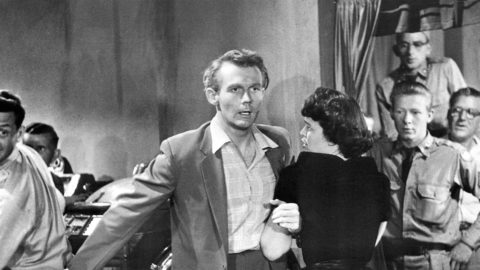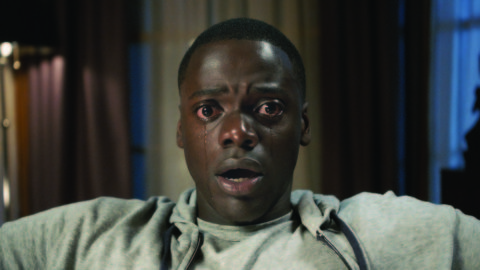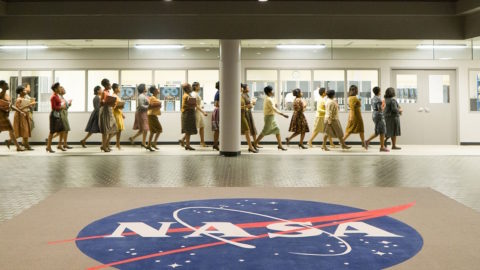Film of the Week: Green Book
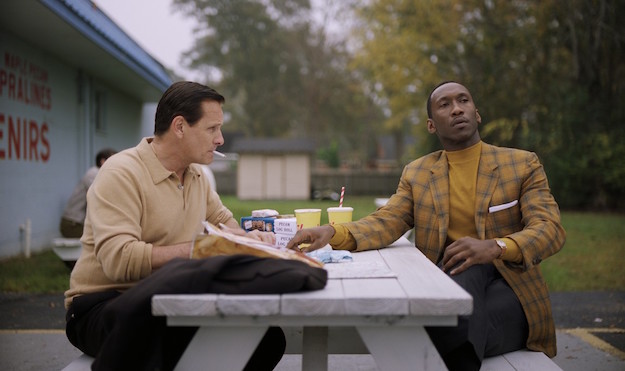
Green Book is a road trip into another era, in more ways than one. It’s a quietly mischievous comedy-drama about race, unimpeachably well-meaning in an old-fashioned way—but something of a benign dinosaur in the age of Get Out, BlacKkKlansman, and Sorry to Bother You. Directed by Peter Farrelly, half of the fraternal team behind such artfully lunkish ’90s farces as Dumb and Dumber, There’s Something About Mary, and Kingpin, the film is based on the experiences of an Italian nightclub bouncer, and later, occasional movie actor, called Frank Vallelonga (aka “Tony Lip”), who in the early ’60s was hired as chauffeur and road manager to jazz pianist Dr. Don Shirley on a tour of the Deep South. Co-written by Nick Vallelonga (the son of Tony Lip), Brian Hayes Currie, and Farrelly, Green Book recounts the unlikely bonding between the two men; it shows how Tony’s racism was cured in the course of their journey, and how Shirley learned to loosen up and love life a little bit more. It won’t be too much of a spoiler to reveal that the film ends on a Christmas scene of conviviality and goodwill. It is, to all intents and purposes, a Yuletide fairy tale.
Set in 1962, the film begins with Tony Lip as a bouncer at the Copacabana nightclub—the sort of place where, whenever you happen to cruise in through the door, Steadicam-style, there will be a tuxedoed smoothie on stage crooning his way through a brassy “That Old Black Magic.” Back home in the Bronx, the Clovers’ doowop number “One Mint Julep” is playing—although the song was 10 years old by then—and Tony’s loving wife Dolores (Linda Cardellini) is there to greet him. So are his father-in-law and other males of the family, there to “escort” Dolores, because two African-American men are repairing something in the kitchen. What the men say about them in Italian is translated in subtitles—“sacks of coal,” “eggplants”—and there’s worse to come in the English dialogue. Tony’s response is to throw out the glasses that the workers have been drinking from, holding them with delicate distaste between thumb and forefinger.
What could possibly change the attitudes of a racist but an encounter with a remarkable man? That man is African-American pianist Dr. Don Shirley (Mahershala Ali), who is looking for a driver to accompany him on a tour of the Deep South. When they first meet, Dr. Shirley guesses that Tony might have issues working for a black man, but has heard about his “innate ability to handle trouble,” and favours him for the job. (What, there were no racially enlightened white tough guys available in New York in 1962? Still, it’s a true story.) The encounter takes place in Shirley’s sumptuously furnished apartment above Carnegie Hall, where the Doctor greets him with lofty courtesy, dressed in an African-style gold-embroidered robe, seating himself in a throne; Tony, not remotely disconcerted by this sumptuous display of hauteur, says he’ll consider driving but he won’t be a valet, and gives the Doctor some no-bullshit talk: “Believe me, you and the Deep South—there’s gonna be problems.”
The duo hit the road, equipped with a copy of The Negro Motorist Green Book, a contemporary manual which advised African-American travellers on safe places where they could travel and stay on their journeys in the U.S. At first, the biggest problem for the duo en route will be a mismatch in personal styles, and in this respect the film is fairly droll: it’s an Odd Couple comedy about a boorish, macho working-class Italian guy and a somewhat snooty African-American aesthete who’s a little more Frasier Crane than you’d expect a jazz pianist to be (or at least, than Tony would expect a jazz pianist to be). The comic repartee is crisp and based on misunderstanding—and usually on Tony’s limited education, in a way that might come across as somewhat condescending, if not for the comic gusto of Mortensen’s acting. Tony mentions that his wife has checked out Shirley’s LP Orphans, the one with children on the sleeve. The Doctor points out that it’s actually Orpheus (the record is his 1956 Orpheus in the Underworld). “Those weren’t children,” he explains, “they were demons in the bowels of hell.” A perplexed Tony replies, “No kidding. They musta been naughty kids.”
The humour is also about Tony’s clueless preconceptions about the Doctor’s black identity. He’s amazed that Shirley isn’t familiar with the pop that he himself plays on the car radio: Chubby Checker, Little Richard, Sam Cooke (“C’mon, these are your people”). He’s also amazed that a black man shows a distaste for the food that he himself guzzles happily. “I’ve never had fried chicken in my life,” says Shirley, recoiling at an offer of a fresh drumstick. “I prefer not to get grease on my blanket.”
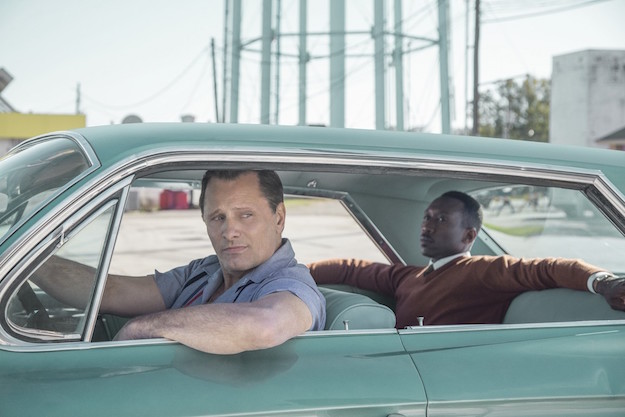
The encounter with Jim Crow racism begins about an hour into the film in Louisville, where for the first time, Shirley is obliged to check in at a “Colored Only” hotel. Eventually we find him in a bar, roughed up by a bunch of white locals who couldn’t have been more cartoonishly cast, and indeed shot—as if racist violence were perpetrated only by people who resemble heavies in a Dick Tracy comic. The ironies get more acute as we move on. Shirley is welcomed with unctuous courtesy when he arrives to play at a mansion in Raleigh, North Carolina. At the formal dinner there, Shirley is told that the menu has been designed in his honour—it’s fried chicken. Then comes the payoff: the host ever so politely refuses him access to the indoor toilet, and directs him to a lean-to latrine in the garden. Elsewhere Shirley’s reception is more openly brutal. Cops pull the travellers off the road in torrential rain, and stick them in a cell—a predicament that Shirley gets them out of by calling a friend in very high places.
Throughout all this, seeing for himself what Shirley has to endure, Tony learns to overcome his own intolerance. But he’s also getting something in return: the urbane pianist takes pity on Tony’s unschooled clumsiness and ghost-writes his letters home to Dolores, making them much more fluently romantic. How can a man, however deeply entrenched his attitudes, be intolerant towards someone who offers him the full Cyrano de Bergerac treatment?
It’s only little by little that we get to understand what kind of man the pianist is. Most viewers of the film won’t have heard of Don Shirley: I certainly hadn’t. Born in Florida, Shirley was trained as a classical pianist, and made a prodigious debut at 18 playing Tchaikovsky with the Boston Pops, but was told that American audiences would have trouble accepting a black concert pianist; he was instead persuaded to play what Shirley describes in the film not as jazz, but as “pop.” Indeed, jazz people might well balk at Shirley’s trademark style, a formal, florid version of that strain of often-disparaged “chamber jazz” that Jacques Loussier also made popular in the early ’60s (where Loussier artily jazzed up Bach, Shirley “classicised” standards such as “I Cover the Waterfront”).
Green Book does apply itself with some thoughtfulness to questions of racial and cultural identity, and ways in which African-Americans may be expected, by other races or their own, to “act” black in certain ways: it’s a film about performance. At the Louisville “colored only” hotel, Shirley sits apart, unable to engage with other black guests and declining their invitation to join in a ball game. They call him “Mr High and Mighty,” and his loneliness is palpable, like a shy child in the playground—but the scene has the unintended effect of infantilising blackness.
The effectiveness of Ali’s performance depends on making Shirley a poignant, even tragic figure, as opposed to a pathetic one, but at times, the film lays on the pathos a little heavily—as when Tony spots him sitting on a balcony alone, drinking his nightly bottle of Cutty Sark, while his two backing musicians chat with women below. It emerges soon after that Shirley’s isolation isn’t just racial and cultural, but sexual too: Tony has to intervene when he’s arrested with a man in a YMCA shower. Eventually, the unflappable Doctor breaks down and rages about being “accepted by no one. Not black enough, not white enough, not man enough—then what am I?” White people, he says in a piquant line, hire him to play in order to feel more cultured, but as soon as he steps offstage, they show what their culture really is.
Occasionally, the film shows Shirley letting slip his urbaneness to show his true feelings: at a concert following one humiliation, his face and his playing both seem charged with angry energy. Later, Tony takes him to an all-black juke joint that the film’s Shirley clearly would never considered frequenting, but where Tony seems absolutely in his element. Hearing that Shirley is a musician, the barmaid invites him to play—and he responds with a thunderous by-heart burst of Chopin. That out of the way, he then sits in with a honking R&B sax combo, at last letting his hair down. He’s playing ‘black’ at last—and it’s Tony who’s taught him how to do it.
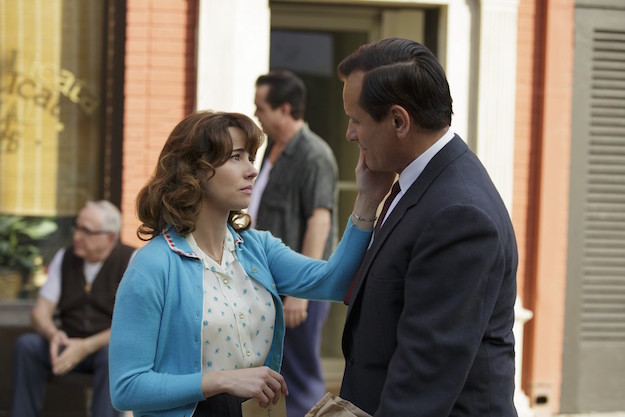
Green Book is a sugar-coated lesson film about ’60s racism, and it makes it all seem simple and easy: violence is usually averted, bigots are put in their place by some straight talk, usually from the film’s Italian-American embodiment of the common sense of the people. In a reversal of the Driving Miss Daisy scenario, it’s the black man who represents patrician, European-style culture, and the white working-class man who puts him in touch with his emotions, and his blackness.
What makes the film watchable is the performances. You might wince at the idea of Mortensen playing a comic Italian-American embodiment of life force, but given how cartoonishly Tony is conceived, Mortensen rises above the challenge by playing it with relish and self-mocking vim. Given that the actor has made a trademark out of laconic, emotionally uncommunicative characters, it’s at the very least a mesmerising oddity to see him play it so joyously broad (broad in every sense: he must have followed Tony’s own diet to bulk up as he has). As for Ali, he beautifully handles a character who’s presented as a mystifying packet of contradictions: someone at once tragic and acutely self-aware, and at the same time, dandyish, snobbish, somewhat absurd. Without making him camp or effete, Ali plays Shirley as a figure of loftily meticulous elegance and wit; when he’s at the keyboard, the intensity with which Ali’s Shirley hammers out Chopin comes across not as the clichéd passion of the concert virtuoso, but as a sort of high-intensity scholarliness.
The nexus of contradictions that Shirley embodies, though, is perhaps less to do with blackness than with culture. Green Book suggests that to be committed to high culture in the U.S. is to condemn yourself to isolation—as we see at the end, when Shirley comes home to his stately but desolate Carnegie Hall apartment. What the film seems to be saying is that high art is all very well, but even lofty talents must finally throw off their fancy manners and join in with the people, whether it’s an Italian family dinner or an R&B blowing session. In the end, Green Book may not really be about race at all, so much as about class.
Jonathan Romney is a contributing editor to Film Comment and writes its Film of the Week column. He is a member of the London Film Critics Circle.



